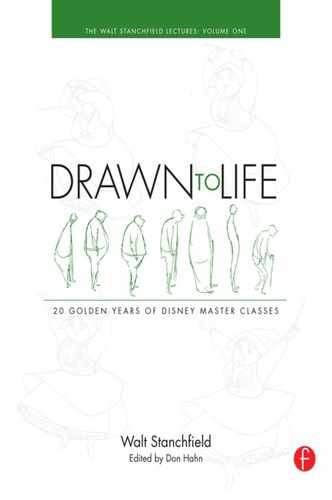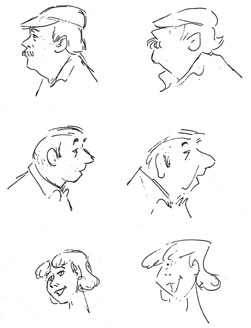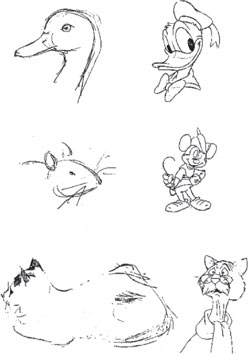We have talked about taking advantage of the model’s build, that is, if he is tall or paunchy or lithe and trying to capture those distinguishing features in your drawing (there is a tendency to draw the ideal figure, the one that frequents the anatomy books and the ones we clip or Xerox and pin up above our desks). The same applies to heads. The model may have a pinched nose, a double chin, baggy jowls, a long upper lip, beady eyes, or a low forehead. These are the things that help determine and emphasize the gesture. Even as the structure of the body determines the possibilities and the uniqueness of a gesture so does the construction of the head and the features of the face, especially if those features can be recognized and caricatured. -
Don Graham said, “ It isn’t how well we draw the joints or the different parts of the anatomy, but how well you know where they are, how they relate and how they work. That’s the important thing.” And as Woolie Reitherman said, “Get the spirit of the thing. That’s the most important and then after that you can add to it.” Ward Kimball said if he could take something apart and put it back together again, he could draw it. Perhaps we could approach drawing the head in that way. If we could analyze the construction of the head, the types of features, and the meaning of the gesture we could draw it.
In animation, the ideal model sheet is one that clearly describes the head shape and the features. The proportions and types of features are all defined and clearly recorded. It will even suggest, somewhat, the extremes one might go to in animating that character. Even then it is not easy. And it is less easy with a live model. Here it is up to us to discover the idiosyncrasies of that person and use them to reveal and enhance the gesture. A reproduction of an anatomy book illustration will not do — no more than it does for the model of one of our characters in a cartoon feature. The basic structure will certainly be useful, but as for an individual character — each person is unique, and the gesture that comes from that uniqueness is what we are striving for.
For the animation artist the ideal lies somewhere in that vast area between realistic/anatomical and cartoon/caricature. Walt’s definition of caricature was “The true interpretation of caricature is the exaggeration of an illusion of the actual, or the sensation of the actual put into action.” Eric Larson said “Caricature comes from the old word, ‘caricatura’ which meant to overload, so we do just that: overload. Caricature implies laughable exaggeration of the characteristic features of a subject, human, animal, building, prop, etc. But caricature needn’t be thought of only as humorous or ludicrous exaggeration — it can be and is simply, “distortion by exaggeration of parts or characteristics” (as per Webster’s Dictionary).
The spirit of the thing as Woolie termed it can more easily be portrayed by exaggeration. It need not be comical. Many very touching drawings of serious and poignant subjects are subtle caricatures of reality. I don’t suggest we remain as subtle as Norman Rockwell or as far out as Gary Larson (Far Out), but don’t forget, we are essentially cartoonists who are in the entertainment field, so with that in mind our model studies should perhaps lean in that direction.
On the following pages I have made some drawings that might be literal sketches of a model, then beside them I have placed some exaggerations of their features to show the possibilities of augmenting both the character and the gesture.


